GCSE results 2023: Results by subject
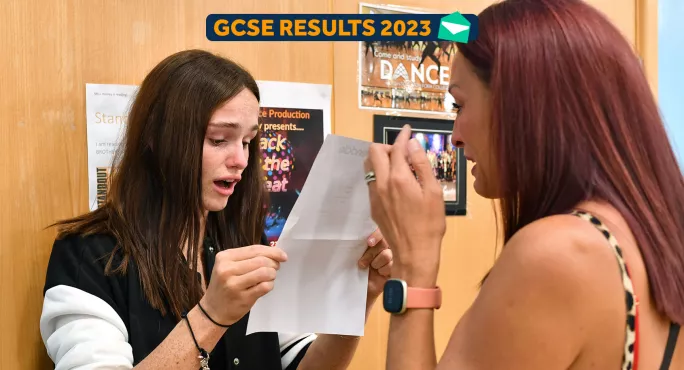
GCSE results were released this morning in England revealing an expected fall in the proportion of top grades awarded to students compared with the last three years, in a planned shift away from the inflated marks seen during the pandemic.
Exams were held this summer for the second year following their reintroduction in 2022 after they were cancelled and replaced with teacher-assessed grades for two years due to the pandemic.
This year, minor mitigations and more generous grade boundaries were put in place by exams watchdog Ofqual to assist students who had experienced disruption to learning and to support the government’s planned return to pre-pandemic grading.
The proportion of students achieving top grades and passes was slightly above pre-pandemic levels, as expected, apart from in Spanish and single-science entries for biology, physics and chemistry.
The slightly lower grades achieved overall for these subjects were due to cohort changes this year compared with 2019, according to Ofqual’s executive director for standards, research and analysis, Dr Ian Stockford.
Here are the headline figures for today’s GCSE results broken down by subject.
GCSE English results
In English language, 16 per cent of entries scored a grade 7/A or above compared with 20.2 per cent in 2022 and 13.9 per cent in 2019.
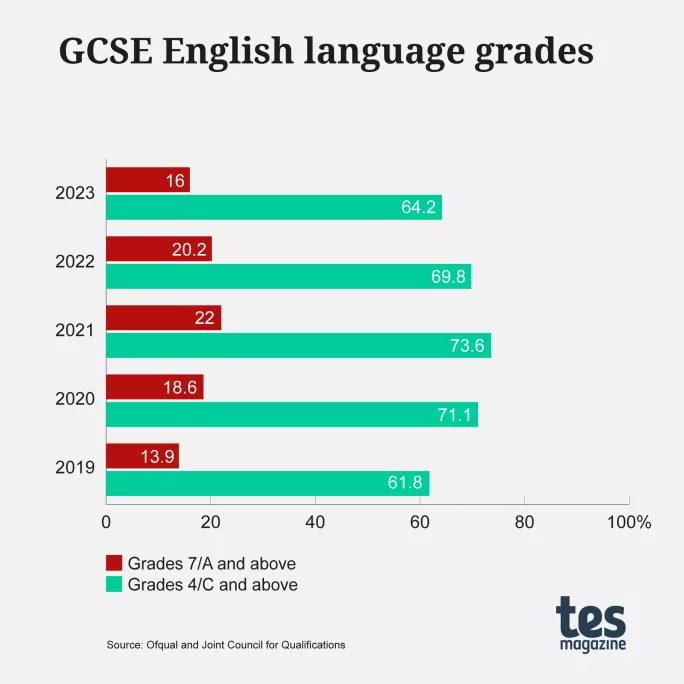
The pass rate at 4/C rose slightly compared with pre-pandemic to 64.2 per cent compared with 61.8 per cent in 2019.
In English literature, 20.6 per cent of entries achieved a grade 7/A or above and 73.9 passed. This is down from last year when 23.8 per cent of students received a grade 7/A or above in English literature and 77.5 per cent achieved a grade 4/C or above.
In 2019, 20.2 per cent of English literature entries received the top grades, while 73.4 per cent received grades 4/C or above.
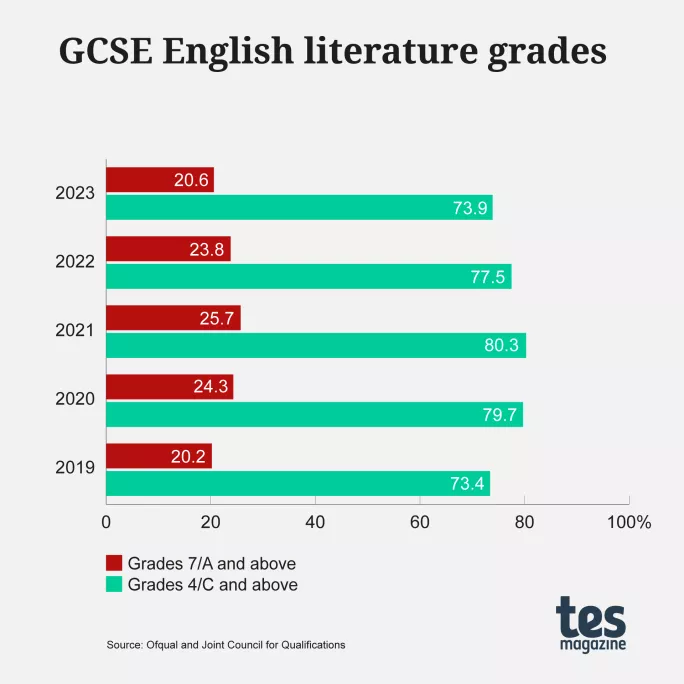
GCSE maths results
In maths, there was a fall in the proportion of students achieving a grade 7/A or above: 17.2 per cent, compared with 19.9 per cent last year, but up on 15.9 per cent in 2019.
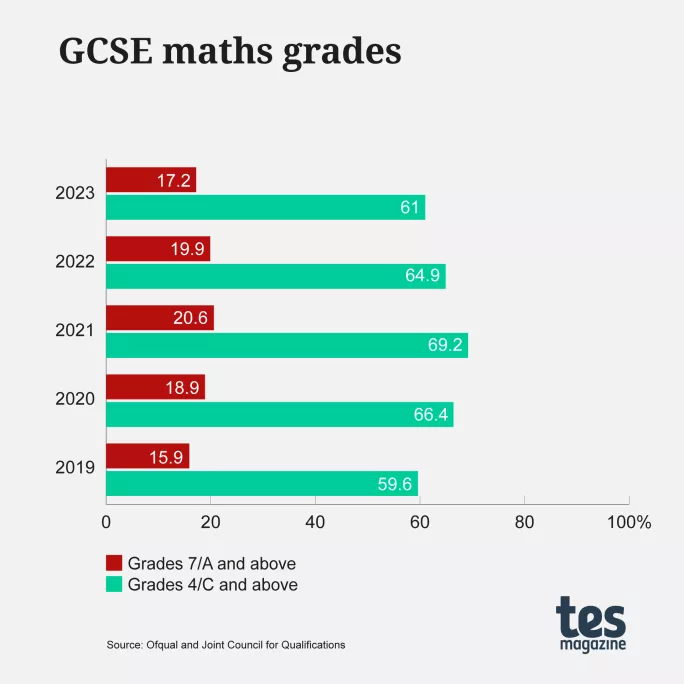
And 61 per cent of entries secured a pass, compared with 64.9 per cent in 2022 and 59.6 per cent in 2019.
GCSE history and geography results
In history, 25.3 per cent of entries scored the top three grades compared with 29.5 per cent in 2022 and 24.6 in 2019.
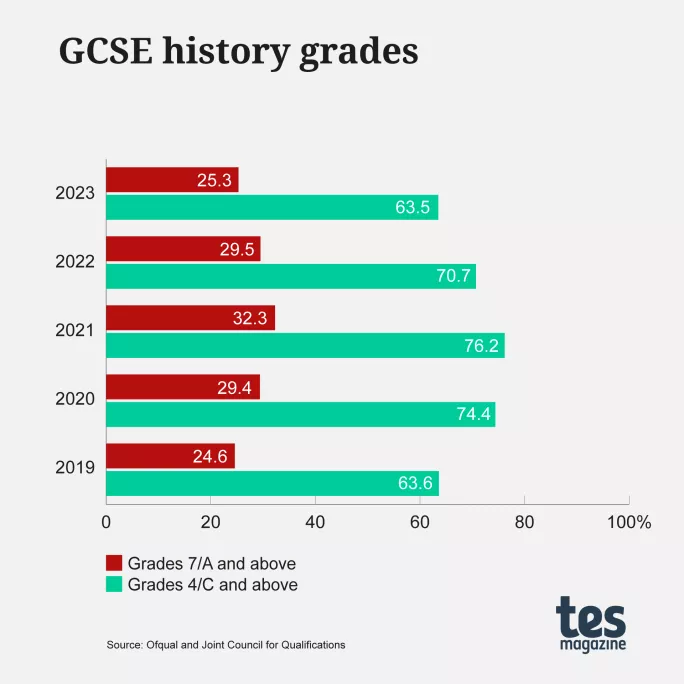
There was a fall in pass rates this year, with 63.5 per cent of entries achieving a 4/C grade or above compared with 70.7 per cent in 2022 and 63.6 per cent in 2019.
In geography, 24.5 per cent of entries achieved a grade 7/A or above and 64.8 per cent achieved a pass, compared with 30.3 per cent and 72.1 per cent in 2022, respectively.
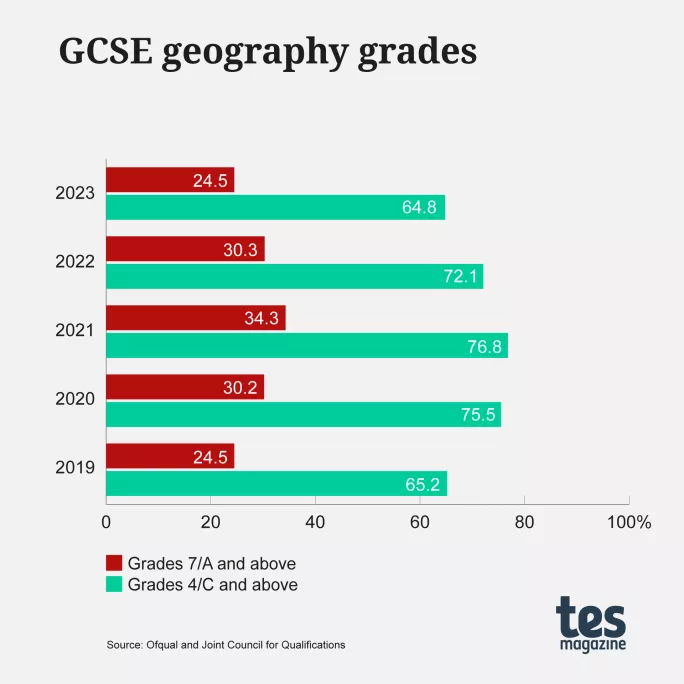
GCSE modern foreign languages results
The proportion of students achieving top grades in Spanish fell compared with last year - but also fell slightly on pre-pandemic levels, unlike the majority of other subjects.
Just over a quarter (26.1 per cent) of entries achieved the top three grades compared with 31.5 per cent in 2022 and 27.1 per cent in 2019.
The levels achieving a pass also fell this year compared with last year and 2019. Just under 7 in 10 (69.2 per cent) achieved a pass this year compared with 77.4 per cent last year and 70.3 per cent in 2019.
Students achieving grades 7/A or above in German were down on last year to 27.6 per cent, compared with 35.1 per cent in 2022, but up on the level achieved pre-pandemic in 2019 (24.2 per cent).
The percentage of students passing their German GCSE was 76.9 per cent this year, down from 83.5 per cent in 2022, but up on 75.8 per cent in 2019.
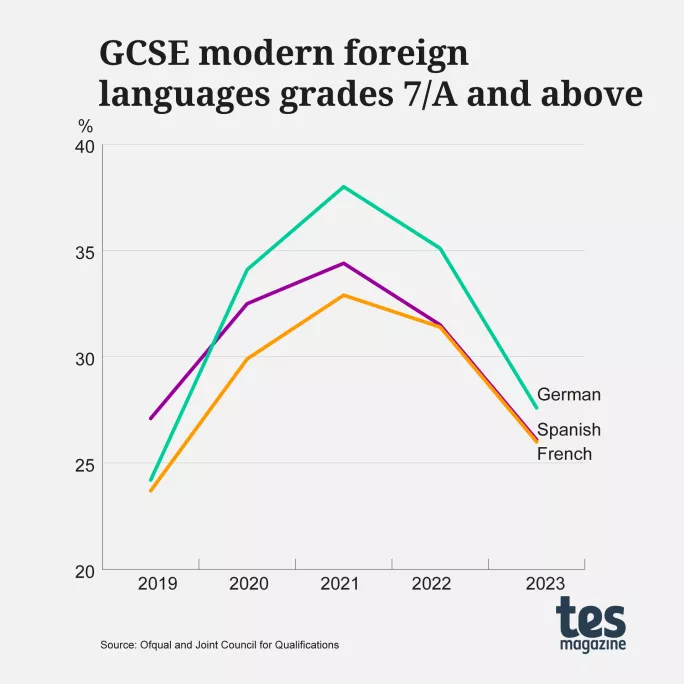
German provisional entries saw a 5.7 per cent fall in entries 2023 to 33,945, compared with 36,000 entries last year.
French continues to be the most popular modern foreign languages (MFL) subject at GCSE, with 126,560 provisional entries this year.
In line with other results, there was a fall in the proportion of students achieving top grades in the subject compared with last year, but an increase on 2019 when grade boundaries were similar.
This year 26 per cent achieved a grade 7/A or above in French compared with 31.4 per cent in 2022 and 23.7 per cent in 2019.
The pass rate fell by 7.6 percentage points on 2022 to 70.5 per cent, compared with 78.1 per cent last year, and 69.7 per cent in 2019.
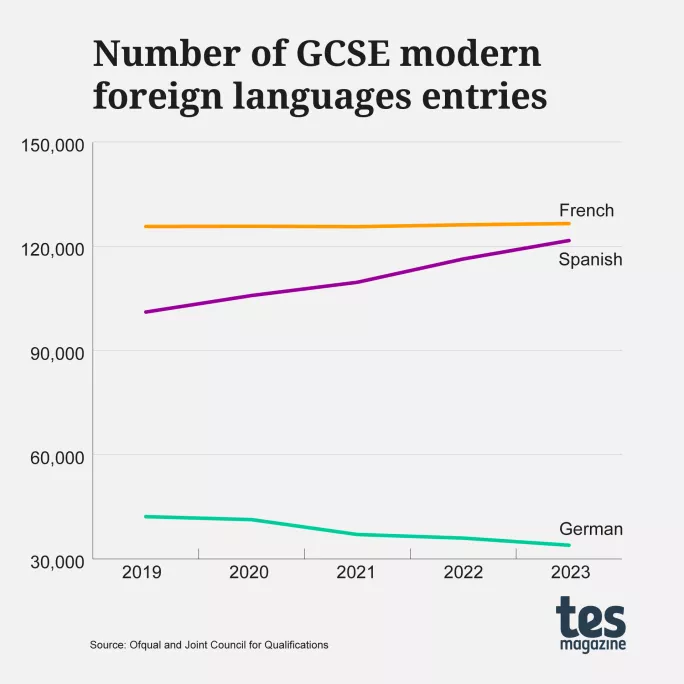
Entry levels for all three MFL saw a rise of 1.3 per cent on 2022 levels, rising to 282,175 from 278,540.
However, the Joint Council for Qualifications said that the data has been affected by an increase in the 16-year-old population since 2019.
In German, the final number of students sitting the exam was 33,677 this year, down from 34,966 last year - and down 18.3 per cent from the 2019 figures when 41,222 sat the exam.
While French continued to be the most popular language, the number of students sitting the exam rose from 122,746 in 2022 to 125,151 this summer.
And in Spanish, entries rose from 107,488 in 2022 to 120,198 in 2023.
In 2023, results for GCSE French and German were again adjusted to better align the grades with Spanish.
GCSE double science, biology, chemistry and physics results
The proportion of top grades achieved in the combined double science GCSE, which is sat by the majority of students, was 8.5 per cent of entries compared with 10.3 per cent last year, and up from 7.5 per cent in 2019.
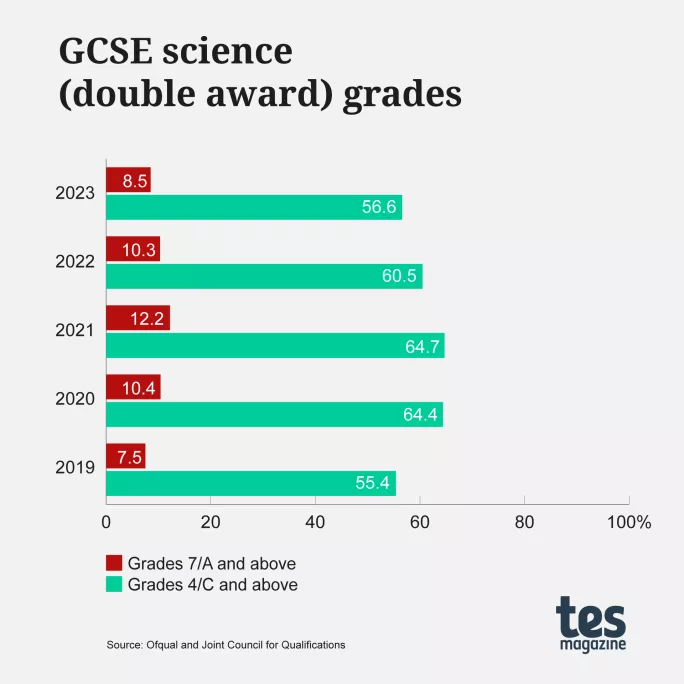
Meanwhile, the pass rate fell by 3.9 percentage points to 56.6 per cent compared with 2022 but was up slightly on 2019, which was 55.4 per cent.
In the three sciences, top grades fell across the board compared with 2022, as expected. But unlike other subjects where top grades were slightly up on pre-pandemic levels - as also anticipated - the proportion of students achieving top marks in individual chemistry, physics and biology GCSE entries fell slightly compared with 2019 levels.
In biology, 42 per cent of entries secured grade 7/A or above compared with 49.8 per cent last year and 42.3 per cent in 2019.
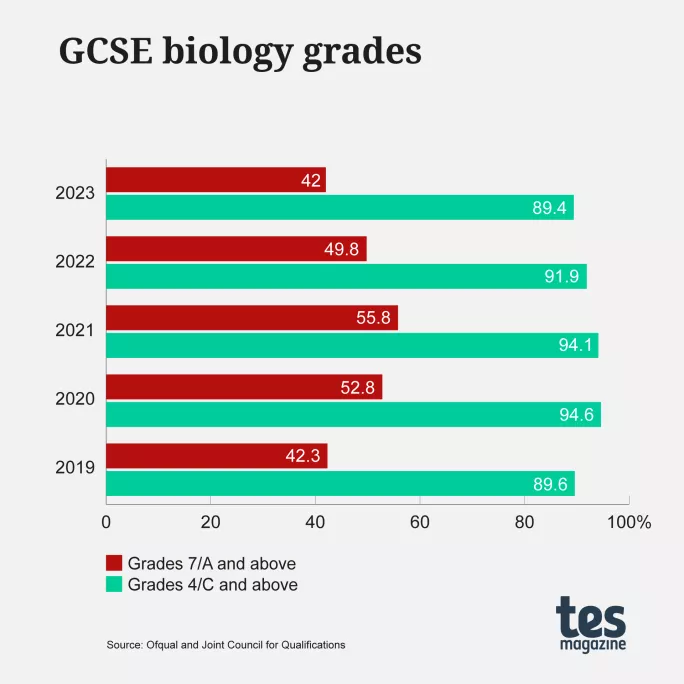
The pass rate also fell by 2.5 percentage points, compared with last year, to 89.4 per cent - and slightly below the 89.6 per cent in 2019.
In chemistry, the proportion of top grades fell by 3 percentage points compared with 2022 to 43.6 per cent, and the pass rate fell by 3.1 percentage points to 89.7 per cent.
The proportion of students achieving a grade 7/A or above in 2019 was 43.9 per cent.
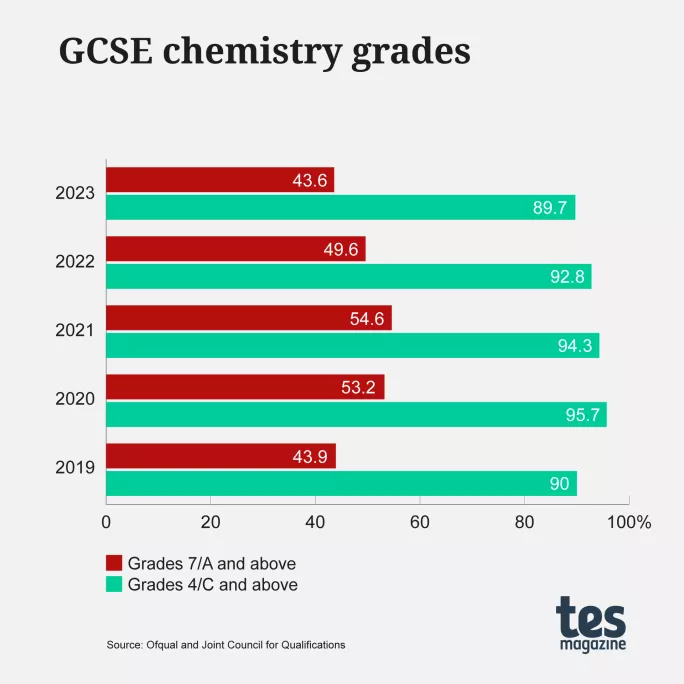
In physics, the proportion of students who achieved a grade 7/A or above fell by 7.3 percentage points compared with 2022 to 43 per cent, which was also a slight fall on levels achieved in 2019 (43.8 per cent).
Meanwhile, the pass rate fell by 3.7 percentage points compared with 2022 to 90 per cent.
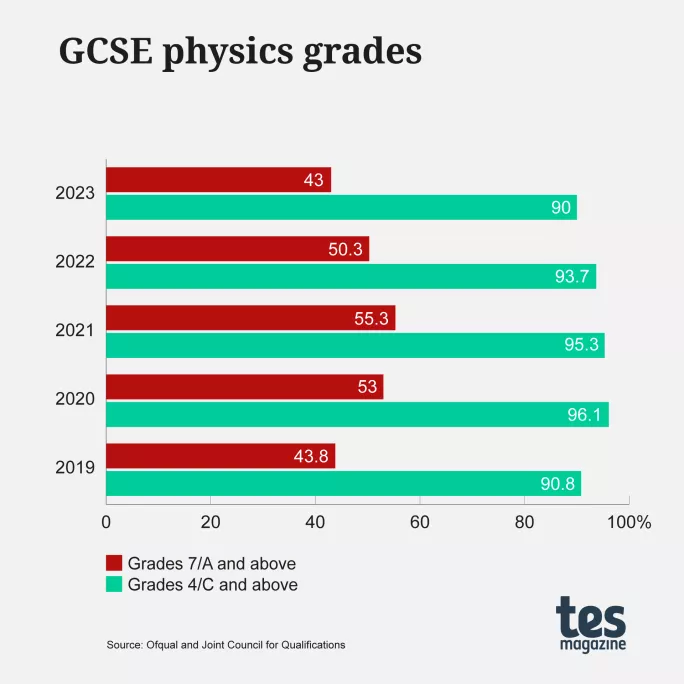
Asked about what might explain the slight drop in top grades compared with 2019 in physics, chemistry, biology and Spanish, Dr Ian Stockford, executive director for standards, research and analysis at Ofqual, said there had been some changes to the cohorts entering these subjects.
Ofqual’s Chief regulator Dr Jo Saxton added that analysis of results has become “obsessive about minor changes” since the pandemic.
GCSE art, music, drama, and design and technology results
Arts subjects saw a fall in overall pass rates compared with last year’s results but remained above 2019 levels.
In art and design, 23.9 per cent secured a grade 7/A or higher compared with 28.1 per cent in 2022 and 22.7 per cent in 2019.
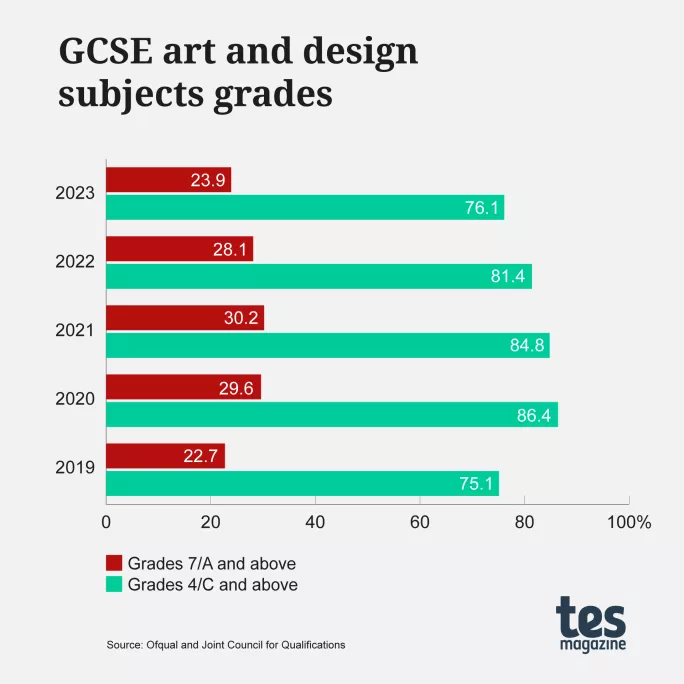
The pass rate in art and design was 76.1 per cent this year, compared with 81.4 per cent in 2022 and 75.1 per cent in 2019.
In music, 33.3 per cent secured one of the top three grades compared with 44.1 per cent last year and 31.8 per cent in 2019.
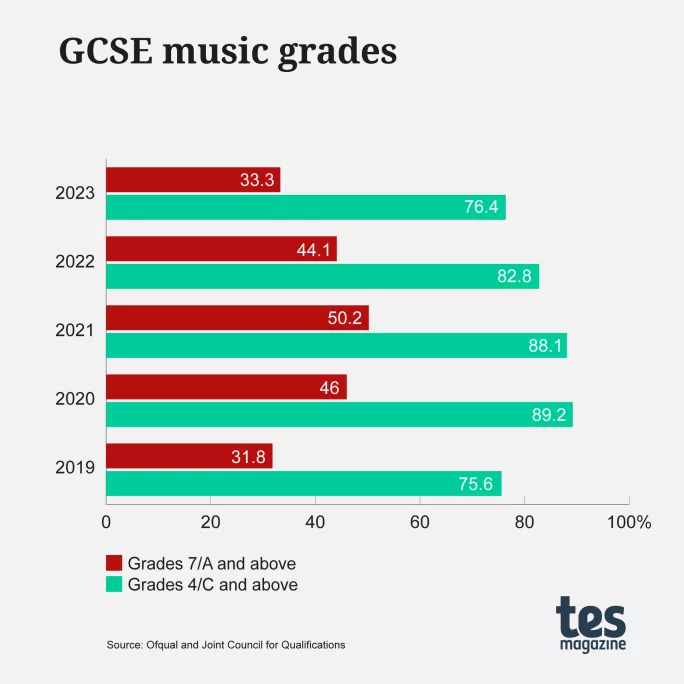
In drama, 25.8 per cent of entries secured a grade 7/A or higher compared with 34 per cent last year.
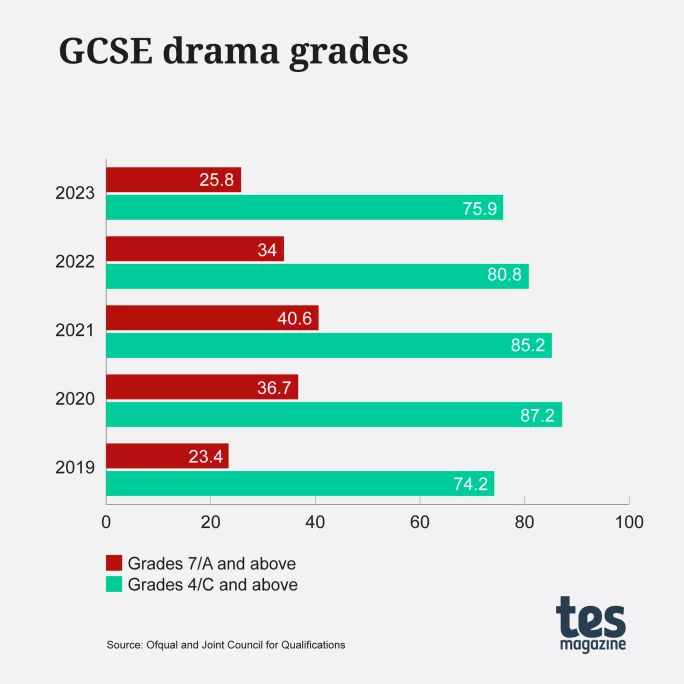
The pass rate in drama was 75.9 per cent this year, a fall from 80.8 per cent in 2022 and up from 74.2 per cent in 2019.
And in design and technology, 21 per cent secured the top three grades, a fall of 5.8 percentage points on 2022 but slightly up on the 19.4 achieved in 2019.
The pass rate was 64.8 per cent this year compared with 63.2 per cent in 2019.
GCSE computing results
The proportion of students achieving the top three grades in computing is down by almost 10 percentage points to 24.4 per cent from 34 per cent in 2022 - but it is above the 2019 figure of 21.6 per cent.
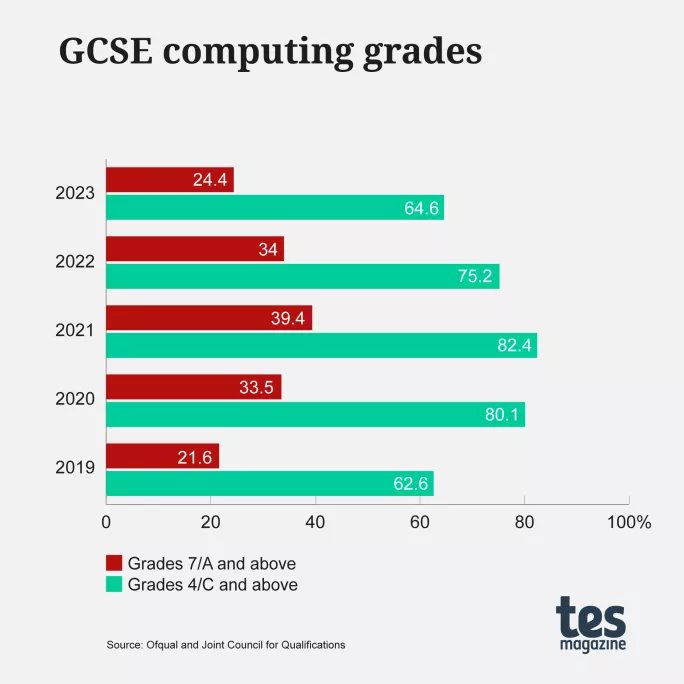
The number achieving a grade 4/C or above was 64.6 per cent this year, down from 75.2 per cent in 2022 and up from 62.6 per cent in 2019.
Provisional entries were up on last year at 79,135, an increase of 2.4 per cent on 2021 numbers.
GCSE PE results
The percentage of students achieving a grade 7/A or above this year in PE was 22.7 per cent, down from 34.1 per cent in 2022 and above the 2019 figure of 21.1 per cent.
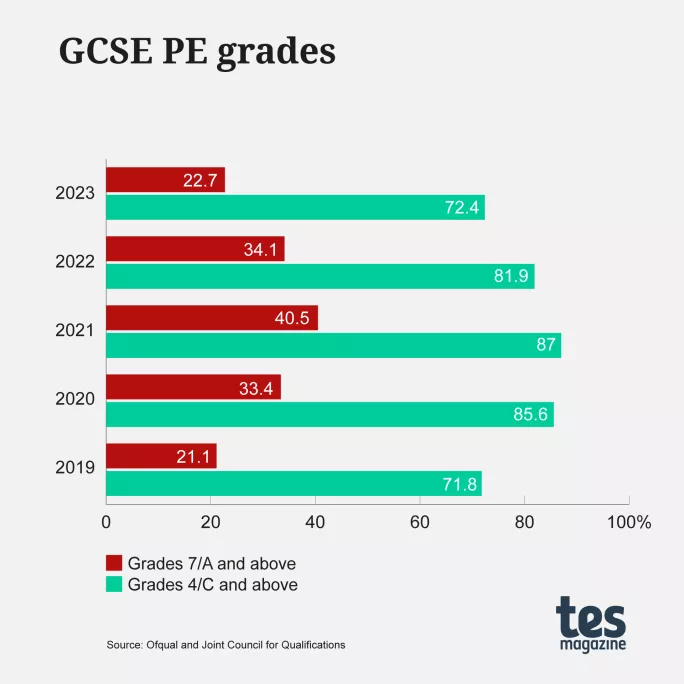
The number passing their PE GCSE this year was 72.4 per cent, down from 81.9 per cent in 2022 and up from 71.8 per cent in 2019.
National Reference Test
The National Reference Test (NRT), which is sat by a representative sample of students each year and can lead to exam boards being asked to reflect drops in attainment in grade boundaries, revealed a “statistically significant downward change when compared to 2017 at grade 4” in English Language.
However, there were “no statistically significant differences in results at any of the other key grades in English or in maths when compared with 2017”.
“These results suggest that performance in English and maths is similar to 2017, the first year of the NRT, with the exception of grade 4 in English, where performance is lower than 2017”, Ofqual concluded.
Despite this, the chief regulator decided not to “implement a downward change” in grading “because this would be counter to the wider policy intent of providing protection for students”.
You need a Tes subscription to read this article
Subscribe now to read this article and get other subscriber-only content:
- Unlimited access to all Tes magazine content
- Exclusive subscriber-only stories
- Award-winning email newsletters
Already a subscriber? Log in
You need a subscription to read this article
Subscribe now to read this article and get other subscriber-only content, including:
- Unlimited access to all Tes magazine content
- Exclusive subscriber-only stories
- Award-winning email newsletters
topics in this article



